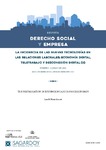The digitalisation of evidence in labour process in Spain

Use this link to cite
http://hdl.handle.net/2183/39280
Except where otherwise noted, this item's license is described as Atribución-NoComercial-SinDerivadas 3.0 España
Collections
Metadata
Show full item recordTitle
The digitalisation of evidence in labour process in SpainAlternative Title(s)
La digitalización de la prueba en el proceso laboral españolAuthor(s)
Date
2021-07Citation
Munín Sánchez, L. M. (2021). The digitalisation of evidence in labour process in Spain. Revista Derecho social y empresa, 15, pp. 101-112. DOI: 10.14679/1190
Abstract
[Abstract] The development of information and communication technology since the
turn of the century has generated new technologies in a short space of time which have
acquired a growing presence in companies. Currently, the influence of ICT reaches practically all organisations and business activity and it can also become a mechanism through
which the sending and receiving of certain communications made by the employees in
the workplace can be recorded. Besides, these tools facilitate the recording of behaviours
which constitute punishable infractions on the part of the employees or the Company
itself. Their evidentiary value is clear, so logically, these new tools must have a place in the
legislation of the means of evidence [Resumen] El desarrollo de las técnicas de la información y la comunicación desde el
cambio de siglo ha generado en poco tiempo nuevas tecnologías que han adquirido una
presencia creciente en las empresas. En la actualidad, la influencia de las TIC alcanza a la
práctica totalidad de las organizaciones y de la actividad empresarial, pudiendo convertirse en un mecanismo a través del cual se puede registrar el envío y recepción de determinadas comunicaciones realizadas por los trabajadores en el ámbito laboral. Además, estas
herramientas facilitan el registro de conductas que constituyen infracciones sancionables
por parte de los empleados o de la propia empresa. Su valor probatorio es evidente, por
lo que lógicamente, estas nuevas herramientas deben tener cabida en la regulación de los
medios de prueba.
Keywords
Labour process
Evidence
New technologies
Digital evidence
Proceso laboral
Medios de prueba
Nuevas tecnologías
Prueba digital
Evidence
New technologies
Digital evidence
Proceso laboral
Medios de prueba
Nuevas tecnologías
Prueba digital
Editor version
Rights
Atribución-NoComercial-SinDerivadas 3.0 España
ISSN
2341–135X






